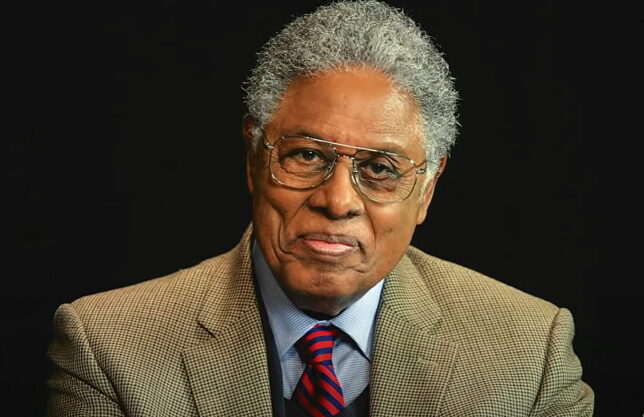Organization Trends
Thomas Sowell on Social Justice Fallacies: Knowledge Fallacies
 What’s tragic is that you have too many people making too many decisions for other people. Too often those making the decisions pay no price for being wrong no matter how high the price paid by others. Credit: ReasonTV. License: https://bit.ly/3tweHm7.
What’s tragic is that you have too many people making too many decisions for other people. Too often those making the decisions pay no price for being wrong no matter how high the price paid by others. Credit: ReasonTV. License: https://bit.ly/3tweHm7.

Thomas Sowell on Social Justice Fallacies (full series)
“Equal Chances” Fallacy | Racial Fallacies
Knowledge Fallacies | Affirmative Action
Knowledge Fallacies
Hogberg: The title of chapter 4 is “Knowledge Fallacies.” Where does the Left go wrong in its understanding of knowledge?
Sowell: They believe that the most consequential knowledge is concentrated in people like themselves. They want to preempt the decisions of other people because they feel that they can make better decisions for them. That is true of early progressives and the later progressives of our time.
The classic tragic example of that is minimum wage law. Employers are willing to offer wages, and workers are willing to accept them to get the job. But then third parties say, “No, that’s not a high enough wage.” And they will preempt the decision that both the employer and the employee have made and raise the minimum wage. The employer, though, not being a chess piece, decides he’s not going to hire as much labor as before. The result is you get huge amounts of unemployment, especially among black teenagers. When you raise the minimum wage, you get more job applicants because the higher wage attracts them. But there are fewer jobs because the employer finds ways of doing without low-skilled workers. So you end up with a chronic surplus of job applicants. And what that means is that it does not cost the employer anything to discriminate against minorities. For every qualified black he turns away, he has plenty of qualified whites to choose from in the surplus applicant pool.
Look at 1948. I’m old enough to remember when President Truman ran for reelection that year making civil rights part of his platform. That cost him huge votes in the South, and some Southerners got together and ran their own third-party candidate. But even with all of that, there was zero difference between the unemployment rate of black and white teenagers at that time. The reason is the minimum wage hadn’t been increased in 10 years. Inflation had all but neutralized it. An ineffective minimum wage increased the cost of discrimination for employers. At that lower wage rate, the pool of job applicants is smaller. If an employer rejects an applicant because he’s black, the job can easily go unfilled because there won’t be enough qualified whites applicants in the pool.
But as they later raised the minimum wage and kept on raising it, the unemployment rate among teenagers in general—and black teenagers especially—rose dramatically. And now there is a big difference between the black and white teenagers that did not exist in 1948. The real irony is during the first year of the Obama Administration, which would not have existed unless ther had been a reduction in racism since 1948, the unemployment rate among black teenagers was 52 percent. It had been 10 percent in 1948. That is the high cost of people who don’t know what they are talking about preempting the decisions of other people who know their own circumstances better than third parties.
Hogberg: Related to that, there is a movement right now to get rid of gas stoves and replace them with electric stoves. Why should I be able to decide what kind of stove I want in my own home versus politicians or environmental activists?
Sowell: Because you know the price you’re paying for the stove you choose better than they do. What’s tragic is that you have too many people making too many decisions for other people. Too often those making the decisions pay no price for being wrong no matter how high the price paid by others.
Hogberg: So if I pay the price, would you say that that gives me more incentive than anyone else in the process to get the decision right.
Sowell: Absolutely.
Hogberg: Recently the head of the American Library Association, Emily Drabinksi, an avowed Marxist, said that “public education needs to be a site of socialist organizing, and I think libraries really do to.” How does that relate to chapter four?
Sowell: If she wants to be a Marxist, it’s a free country. But the question is what gives her the right to make other people’s decisions? If you look at the history of the 20th century, most of the great tragedies of that century came out of elites who thought they knew better. When totalitarian dictatorships appeared in the 1920s and 30s, intellectuals in Western democratic nations were full of enthusiasm for them.
People often don’t realize that intellectuals were in favor of those dictatorships, even the Nazis. It was George Bernard Shaw who chided Americans for being against dictators, arguing that dictatorships get things done. The things they got done, we discovered as time went on, were some horrible things.
In the next installment, the political Left disregards the reduction of poverty that doesn’t fit the social justice narrative.


